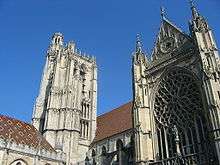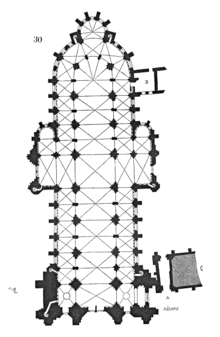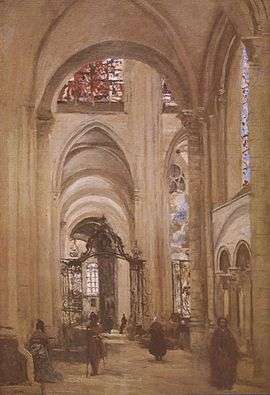Sens Cathedral
| Cathedral of Saint Stephen of Sens Cathédrale Saint-Étienne de Sens | |
|---|---|
 South portal | |
| Basic information | |
| Location | Sens, France |
| Geographic coordinates | 48°11′52″N 3°17′01″E / 48.1979°N 3.2837°ECoordinates: 48°11′52″N 3°17′01″E / 48.1979°N 3.2837°E |
| Affiliation | Roman Catholic Church |
| Province | Archdiocese of Sens |
| Ecclesiastical or organizational status | Cathedral |
| Status | Active |
| Architectural description | |
| Architectural type | Church |
| Architectural style | Gothic |
| Groundbreaking | 1135 |
| Completed | 1534 |
Sens Cathedral (French: Cathédrale Saint-Étienne de Sens) is a Catholic cathedral in Sens in Burgundy, eastern France. It was one of the earliest Gothic buildings in the country, and the largest of the early Gothic churches. The choir was begun in 1140. As was typical in cathedral construction work progressed westwards, building the nave, with the west front completed around 1200. The structure was finally completed in the 16th century. The architecture of its choir influenced, through the architect William of Sens, that of the choir of Canterbury Cathedral.
Description
Sens was a place of considerable importance in the 12th century, seat of the "Primate of Gaul" and superior to the bishopric of Paris.[1] The cathedral church was therefore built on a large scale according to the latest principles. Sens' nave is unusually wide, and the church is larger in overall scale than its contemporaries at Saint Denis, Noyon or Senlis.[2] As is typical with early gothic architecture, the vaulting is sexpartite, surmounting a modest clerestory, with alternating piers and columns between bays. Sens may have been the first church to be completely vaulted in this manner. A gallery opens into the roof space between the aisle arcade and the clerestory. The interior elevation resembles that of Le Mans, but with less massive walls.[1] Flying buttresses were originally employed on the outside, but were replaced with new ones in the thirteenth century.[3] Sens did not initially have transepts; these were only completed between 1490 and 1518 by Martin Chambiges in the Flamboyant Gothic style.[4]
Sculpture and decoration


The west front is pierced by three portals. That in the middle has sculptures representing the Parable of the Ten Virgins and the story of St Stephen. The right-hand portal contains twenty-two statuettes of the prophets, which have suffered considerable damage. Above this portal rises the stone tower, decorated with armorial bearings and with statues representing the principal benefactors of the church. The bells in the campanile by which the tower is surmounted enjoyed immense reputation in the Middle Ages; the two which still remain, La Savinienne and La Potentienne, weigh respectively 15.3 tons and 13.8 tons. The left portal is adorned with two bas-reliefs, Liberality and Avarice, as well as with the story of John the Baptist. The portal on the north side of the cathedral is one of the finest examples of French 16th-century sculpture. That on the south side is surmounted by a magnificent stained-glass window. Other windows of the 12th to the 16th century are preserved, some of them representing the legend of Thomas Becket of Canterbury.
Among the interior features are the tomb of Louis, Dauphin of France (son of Louis XV) and his consort, Marie-Josèphe of Saxony, one of the works of Guillaume Coustou the Younger, and bas-reliefs representing scenes from the life of Cardinal Antoine Duprat, chancellor of France and archbishop of Sens from 1525 to 1535. The mausoleum from which they came was destroyed in the French Revolution.
The cathedral treasury, one of the richest in antiquities in France, contains a fragment of the true cross presented by Charlemagne, and the vestments of Thomas Becket. The treasury is now kept at a museum.
It was in the cathedral of Sens that St Louis, in 1234, married Marguerite of Provence, and five years later deposited the crown of thorns.
Sources
-
 This article incorporates text from a publication now in the public domain: Chisholm, Hugh, ed. (1911). "article name needed". Encyclopædia Britannica (11th ed.). Cambridge University Press.
This article incorporates text from a publication now in the public domain: Chisholm, Hugh, ed. (1911). "article name needed". Encyclopædia Britannica (11th ed.). Cambridge University Press. - Plein, Irene (2005). Die frühgotische Skulptur an der Westfassade der Kathedrale von Sens. Münster: Rhema-Verlag. ISBN 978-3-930454-40-2.
- Théodore Tarbé, Description de l'église métropolitaine de St-Etienne de Sens: recherches historiques et anecdotiques (Sens: The author, 1841).
- Eugène Vaudin, La cathédrale de Sens et ses trésors d' art (Paris: Champion 1882).
- G. Julliot, Trésor de la cathédrale de Sens (Sens: Ch. Duchemin 1886).
- E. Chartraire, La cathédrale de Sens (Paris: Henri Laurensn n.d. but after 1914).
- Lucien Bégule, La cathédrale de Sens (Lyon: Société anonyme de l'imprimerie A. Rey, 1929).
- Denis Cailleaux, L'oeuvre de la croisée de la cathédrale de Sens (1490-1517): un grand chantier ecclésiastique à la fin du Moyen Âge d'après les sources comptables (Thèse de doctorat : Art et archéologie : Paris 1 : 1994).
References
- 1 2 Klein, Bruno (2010). "The Beginnings of Gothic Architecture in France and its Neighbors". In Toman, Rolf. Gothic Architecture, Sculpture, Painting. Potsdam: H.F. Ullmann. p. 39. ISBN 978-3-8331-1038-2.
- ↑ Cruickshank, Dan, ed. (1996). Sir Banister Fletcher's A History of Architecture (20th ed.). Architectural Press. p. 425. ISBN 0-7506-2267-9.
- ↑ Fletcher, p. 426
- ↑ Clark, William. "Sens". Grove Art Online/Oxford Art Online. Oxford University Press. Retrieved May 7, 2015.
External links
- Saint-Étienne de Sens at Structurae
- Cathédrale de Sens at Diocèse de Sens-Auxerre (French)
- Pictures of Sens Cathedral
| Wikimedia Commons has media related to Sens Cathedral. |